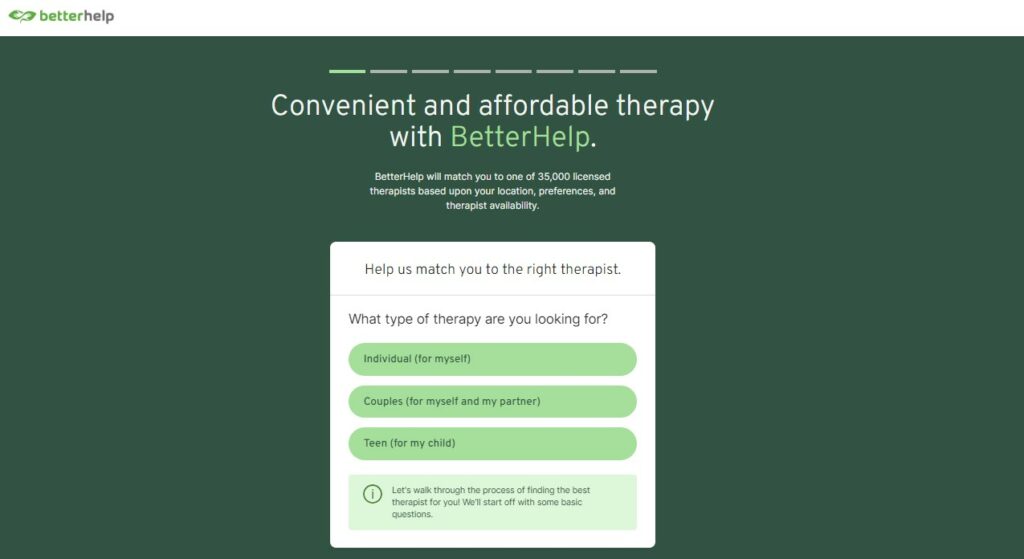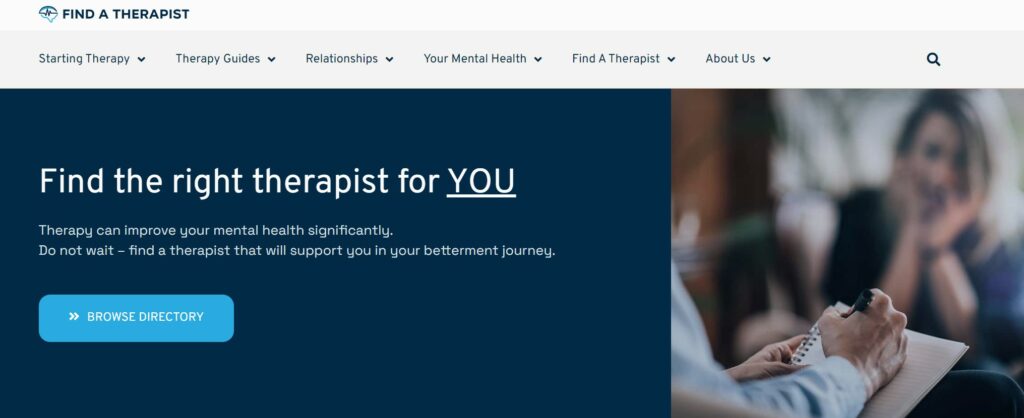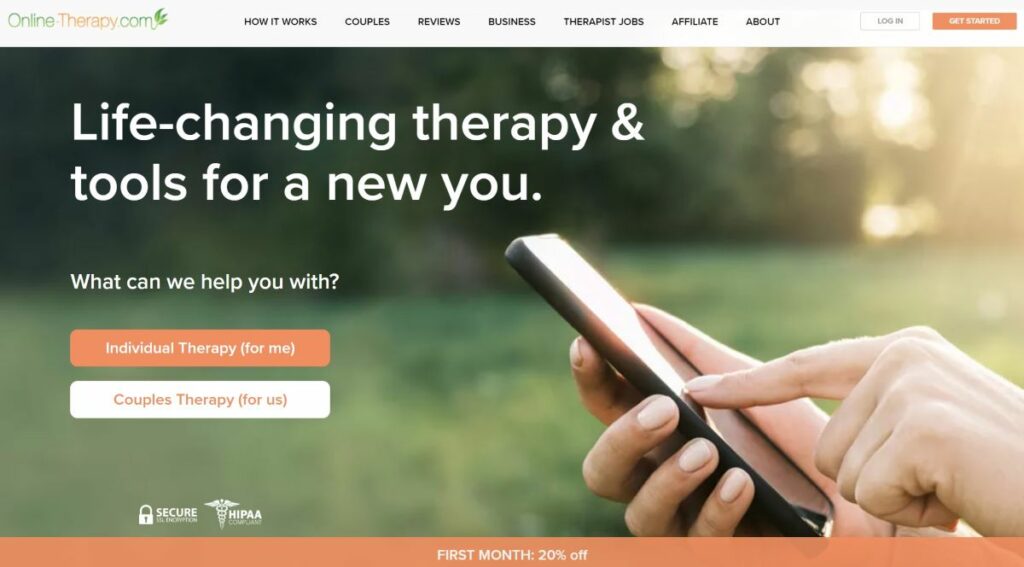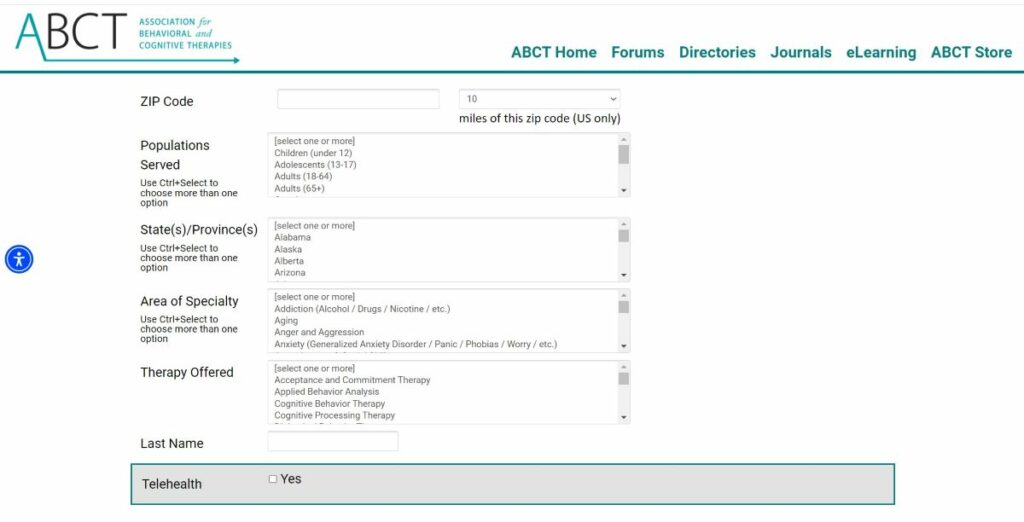Cognitive Behavioral Therapy (CBT) is one of the most common methods used by psychologists to help manage mental health problems.
Most of the problems that CBT helps with are caused or influenced by your negative thoughts and behaviors. Cognitive behavioral therapists help you recognize and change your negative thoughts and behaviors, and replace them with positive ones.
In this guide, we’ve explained how to find a qualified CBT therapist both online and in-person who can help treat you.
Want to skip right to the suggestions for Cognitive Behavioral Therapists? Here are our 6 recommended therapy solutions:
- BetterHelp
- Find-a-therapist.com
- Online-therapy.com
- Calmerry
- TalkSpace
- Association for Behavioral and Cognitive Therapies Directory
Cognitive Behavioral Therapy Near Me
Below, we’ve looked at six different websites you can use to connect with a CBT professional near you or online, considering finding a therapist near you can be challenging due to geographical location and high demand for therapeutic services.
| Provider | Good For | Location | Pricing |
|---|---|---|---|
| BetterHelp | Quick match with the right therapist for you | Online therapy | $65 to $90 per week (billed every 4 weeks) |
| Find-a-therapist.com | Finding and contacting the right therapist for you | Online and in-person therapy | Varies depending on the counselor fee |
| Online-therapy.com | Finding licensed and experienced therapists with a Cognitive Behavioral Therapy (CBT) approach | Online therapy | $40/week to $88/week (including our 20% discount first month) |
| Calmerry | Depression therapy, online grief counseling, anxiety therapy, therapy for OCD, self-esteem therapy, LGBT-friendly therapy | Online therapy | $49.50 to $73.75 per week (billed monthly) |
| TalkSpace | Depression, anxiety, bipolar disorder, OCD, PTSD, psychiatry | Online therapy | Varies according to insurance coverage or self-pay options |
| Association for Behavioral and Cognitive Therapies Directory | Choosing the right CBT therapist for your specific needs | Online and in-person therapy | Varies depending on the counselor fee |
1. BetterHelp

Explore emotional well-being with BetterHelp – your partner in affordable online therapy. With 30,000+ licensed therapists and plans starting from only $65 per week, BetterHelp makes self-care accessible to all. Complete the questionnaire to match with the right therapist.
- Good for: Quick match with the right therapist for you.
- Location: Online therapy.
- Pricing: $65 to $90 per week (billed every 4 weeks).
- Features: iOS and Android app available, message your therapist anytime, live sessions are scheduled weekly and done via live chat, phone, or video call.
BetterHelp is an online platform that can help you find the right therapist for your mental health needs. Many of the therapists on this platform use CBT as the main psychological method in their practice, and you can also request the platform to match you with a therapist specifically experienced in CBT if you’d like.
Read our BetterHelp review here.
2. Find-a-therapist.com

- Good for: Finding and contacting the right therapist for you.
- Location: Online and in-person therapy.
- Pricing: Varies depending on the counselor fee.
- Features: Filter your search, find accessible and effective online and in-person therapy, find guides on different types of therapy.
Find-a-therapist.com is an online directory that allows users to tailor their search for therapists, facilitating the process of finding a Cognitive Behavioral Therapist like May Izadi or Regina Lazarovich.
3. Online-therapy.com

Discover transformative online therapy with Online-therapy.com. Through cognitive behavioral therapy (CBT), Online-therapy.com offers individual and couples support starting at $45/week. Engage in sessions via video, voice, or text for maximum flexibility. Fill out their online questionnaire to get started.
- Good for: Finding licensed and experienced therapists with a Cognitive Behavioral Therapy (CBT) approach.
- Location: Online therapy.
- Pricing: $40/week to $88/week (including our 20% discount first month).
- Features: Unlimited messaging with your therapist, including a daily journal and activity plan, yoga and meditation videos, and tests to see your progress.
The therapists on online-therapy.com specialize in using CBT to diagnose and treat mental health issues. After joining the platform, you can match with one of their CBT professionals, and you’ll get a therapy session with them each week, carried out over a video call, voice call, or live chat.
Read our online-therapy.com review here.
4. Calmerry

Embark on a journey of mental wellness with Calmerry. With diverse subscription options, starting at just $50, Calmerry makes prioritizing your mental health simple and accessible. You can message your therapist any day or schedule a live therapy session from the comfort of your home from any device.
- Good for: Depression therapy, online grief counseling, anxiety therapy, therapy for OCD, self-esteem therapy, LGBT-friendly therapy.
- Location: Online therapy.
- Pricing: $49.50 to $73.75 per week (billed monthly).
- Features: Message to your counselor anytime, text therapy and video therapy according to the plan you choose, free counselor switching.
Calmerry is an online platform that features experienced licensed professionals, including Cognitive Behavioral Therapists dedicated to addressing mental health issues like depression, anxiety, grief, and others.
Read our comparison between Calmerry and BetterHelp here.
5. TalkSpace

Tailored to individuals, couples, teens, and offering psychiatry services, Talkspace plans kick off at a wallet-friendly $69 per week. What’s more, many health insurances also cover their services, enhancing accessibility and affordability. Complete a questionnaire and get matched with the right therapist for you.
- Good for: Depression, anxiety, bipolar disorder, OCD, PTSD, psychiatry.
- Location: Online therapy.
- Pricing: Varies according to insurance coverage or self-pay options.
- Features: Accepts insurance, pick your therapist from a list of recommendations, live video sessions and unlimited messaging with your therapist, medication management.
TalkSpace facilitates your connection with Cognitive Behavioral Therapists through a straightforward process. Upon signing up, you complete a brief assessment that guides the matching algorithm to pair you with a list of therapists suited to your needs and preferences.
Read our TalkSpace review here.
6. Association for Behavioral and Cognitive Therapies Directory

- Good for: Choosing the right CBT therapist for your specific needs.
- Location: Online and in-person therapy.
- Pricing: Varies depending on the counselor fee.
- Features: Online directory, compare each therapist’s credentials, contact a CBT therapist near you.
The Association for Behavioral and Cognitive Therapies (ABCT) has an online directory on its official website to help you locate a CBT professional near you. To use the directory, you need to select your state, provide your age group, choose an area of specialty, and mention that you’re looking for CBT, rather than other similar types of therapy, such as Cognitive Processing Therapy.
What is CBT?

Cognitive Behavioral Therapy (CBT) is a talking therapy that changes your behavior by focussing on your thought patterns and behaviors. Thoughts, beliefs and attitudes drive your feelings and behavior (and vice versa).
Cognitive Behavioral Therapy works on the basis that an alteration and changes in thinking could result in the achievement of desired behavioral changes and the attainment of your desired beliefs. For example, an increased sense of self-belief, if you are suffering from low self-esteem.
Cognitive Behavioral Therapy helps alleviate your problems by breaking them down into smaller, more manageable parts to create positive change.
In a therapy session, the CBT therapist may ask you to break down your entangled negative thinking into smaller parts, focus on the issue, identify the root cause of the problem, and change your thought patterns toward more positive and productive behavioral outcomes.
What issues does CBT treat?
As discussed earlier, your behavior is driven by your thoughts and feelings. For example, a person who thinks more about plane crashes is more likely to avoid air travel.
The main aim of CBT is to teach you that you cannot control everything around you, but you can control your perception, thoughts, and interpretation of things that occur in your life, and the information you receive. For example, making it possible for you to travel by plane if you need or want to.
It is found that CBT is beneficial in treating a range of mental health disorders, including:
- Anger
- Phobias
- Depression
- Personality disorders
- Addiction
- Bipolar disorder
- Anxiety
- Eating disorders
- Panic attacks
Apart from these mental health disorders, CBT is also used in the treatment of:
- Body-image difficulties
- Smoking abstinence
- Fluid restricted dialysis patients
- Insomnia
- Chronic pain
- Grief
- Self-esteem problems
- Stress management
- Relationship issues
- Working through a difficult divorce process
Five steps to change your thinking using CBT

Most of your thinking patterns are learned, not innate.
These learned (or conditioned) thought patterns mostly come from your social and societal environment – such as your friends, family, peers and culture. The issue is, these learned thoughts are sometimes negative and unproductive.
CBT helps to change your negative and unproductive thought patterns. This type of treatment uses the technique of cognitive restructuring, which identifies your negative and unproductive thinking, restructuring it to effect more balanced and positive thinking.
Cognitive restructuring may involve different steps and techniques to help you restructure or reframe your experience. For example, you may actualize this through the five steps and the list-making exercise included below.
1. Identify the situation
Describe the situation that is upsetting you. For example, not applying for the job you want. You can think of who was there and who was absent (who), where this took place (where), in what setting (family, social, work, public, private)
2. Identify the feeling
Describe how the situation makes you feel. Often, we can experience different feelings at the same time. In that case, choose the most pressing or intense feeling that surfaces for you in this situation. For example, hopelessness.
3. Identify the thought(s)
Identify which thoughts are underlying your feelings in this situation. Often, there are recurring or common thought patterns that surface in multiple settings and situations (recognized as habitual or automatic thinking). For example, ‘I am not good enough’.
4. Evaluate your thinking
Think of what objective evidence or facts you have to support this thinking examining its accuracy. Write this down. Now, write down all the evidence you can think of that supports the exact opposite of what you thought initially (‘I am good enough’).
Questions that may support you in your examination may include: Can I be absolutely sure that this is true? What is a likely alternative scenario? What evidence, information and facts do I have to argue the alternative case?
5. Make a decision
Think of yourself as a researcher or objective witness, now it is time to decide whether your initial thought was accurate or not based on the evidence you have gathered.
If the thought is inaccurate, you replace it with a more positive and supportive thought that you can follow to move into action (‘I am good enough’ supporting your job application).
List-making Exercise
| List-making | Description |
|---|---|
| Set-up | Cognitive restructuring, can also be explored through this list-making exercise in which you make two columns on a sheet of paper. The left column is titled “Old Thoughts”, and the right column is titled “New Thoughts”. This helps to structure and define the exact changes you would like to make. |
| Recording of unproductive thoughts | All negative and unproductive thoughts that come to mind throughout the day are mentioned in the left column. These thoughts may include anxious thoughts, self-critical thoughts, and depreciating or self-limiting thoughts. You may also want to notice and record the situation (when do these thoughts come up), and name and grade the intensity of the emotion (what do you feel when you think this), accompanying these thoughts. |
| Replacing the unproductive thoughts | In the right column, each unproductive thought is replaced by a productive thought. With help from your therapist, you can set goals for the changes you would like to make in your thought patterns. The formation of new thoughts is based on questions being asked by yourself, or you can write the opposite of your unproductive thought. Productive or new thought must be more original, self-affirming, and constructive. |
| Continuous reading of the list | After writing down the old and new thoughts, you must read the script twice a day. Reading can help you memorize the newly mentioned thoughts, in order to work on them. You will also work through these thoughts with your therapist, to help you to make these changes in your day-to-day thinking, as we’ll discuss below. |
| Notice and replace | In this step, you will begin to notice any negative thoughts coming into your mind throughout the day. Any negative thought is rejected abruptly, and instead, you must focus on the new thought you have replaced it with. This cognitive structuring takes time, but it can change your thinking pattern and help you eliminate your negative thoughts. If you struggle with this step, your therapist will be on-hand to help. |
Techniques used

Many different treatment techniques are used in Cognitive Behavioral Therapy. Some of them are discussed below.
| Technique | Description |
|---|---|
| Reframing or Restructuring | Using this technique, your therapist asks you about your thinking process in different situations. Focusing on the thinking process enables you to identify negative thoughts. After the identification of these issues, it is easier to restructure your negative thoughts into more productive and positive ones. |
| Guided Discovery | In guided discovery, the therapist familiarizes themselves with your thought patterns by asking questions designed to challenge your beliefs. This approach might enlighten your cognition, and you may learn to see things from other perspectives, helping with attitude modification. |
| Exposure Therapy | Exposure therapy is used to treat different types of phobias. Your therapist may expose you to the things you are afraid of, and teach you techniques to overcome the fear. This type of therapy is done in small parts, and you are exposed to your fear gradually. The exposure might be an actual exposure to the feared situation or object, or through imagining the situation or object there. Both methods are an effective means in familiarizing you to gradually tolerate felt discomfort. In due course, you become resistant to your fear, and more confident in your coping abilities. |
| Thought Record | This technique involves the record-keeping of your negative and positive thoughts, by writing them down. Your therapist may analyze your written thoughts and help you change your cognition by blocking the negative thoughts and promoting the positive ones. |
| Behavioral Experiments | This technique is used to treat anxiety disorders in particular. A CBT therapist may ask you to think of issues or tasks that make you anxious, and predict their outcome. Over time you may realize that your predicted outcome is not what is likely to happen, and eventually, thinking of this task might not initiate anxiety. The key element in this therapy is to start with lower-anxiety tasks and gradually work towards higher-anxiety tasks. |
| Relaxation Techniques | A CBT therapist may refer to physical relaxation techniques like muscle relaxation, deep breathing exercises, and imagery to help alleviate stress, depression, and social anxieties. |
| Successive Approximation | Successive approximation breaks complex and overwhelming tasks into smaller, simpler, and more achievable ones. CBT therapists use this technique to build confidence and self-assurance. |
| Role Playing | A CBT therapist might create a specific scenario and ask you to handle the situation. This technique may help you cope with potentially tough circumstances and reduce your fear of social anxiety. Moreover, this technique can also be used in refining problem-solving and communication skills. |
Barriers or challenges

There are also some common challenges associated with CBT, or barriers that can impede the success of your treatment, which it’s useful to be aware of.
- Change is difficult – even after recognizing that your thoughts are not rational. It can be very difficult to change your thought patterns, especially if they have been ingrained in your mind for a long time.
- CBT is structured, meaning that the therapist acts as an instructor, and you must follow their instructions. It is best for people who are comfortable with a focused and structured approach.
- Progress is gradual, not immediate. CBT does not normally take a long time to complete treatment, but it’s not a quick fix.
- You must be willing to change, otherwise, the effectiveness of CBT will be reduced, as homework-based tasks and self-assessment might be ignored.
Conclusion
CBT is the main psychological therapy used to treat many different types of mental health conditions. To get help from a CBT professional online or in-person, above are affordable and convenient platforms that can quickly connect you with a licensed CBT provider over the internet.
Still not sure how to find the right Cognitive Behavioral Therapist? Contact us and we’ll get back to you as soon as possible.





